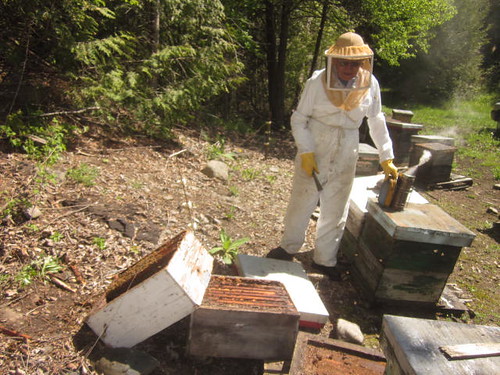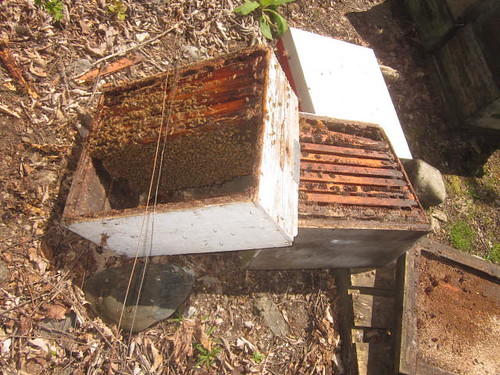Some black bears did launch an attack on of our remote beeyards last week!
This is what bear damage looks like, and it could have been a lot worse. The total loss was only four frames of brood. And that's because this beeyard, like all of our locations in southern Ontario, is protected by a heavy duty solar fencer.
Its unlikely the hive blew over in the wind - in the time that has passed since we last visited this location there hasnt been any extreme weather. But if it was upset by bears, then how did they manage to get over the fence?
I have come to believe that a momma bear somehow managed to leap the perimeter - once. She then got the biggest electric shock of her life, and ran way back into the woods to recuperate.
The fence is only two strands of wire but they are electrified to 12 volts by a solar panel charged capacitor mechanism. Its snaps when its at full strength. The animal must have felt the shock at least once, for it did no real damage except to knock over one beehive,
I reckon as soon as the bear got shocked on the fence it ran away bawling back into the woods. In my crime scene reconstruction I have a second perpetrator, and perhaps even a third involved in this ‘break and enter’ heist and murder of bees.
These accomplices had the presence of mind to stay at the site and capitalize on what the first bear had achieved before they too were shocked and gave up trying to get more grub. They successfully pulled four wax frames of brood, which is what beekeepers call the queen bee’s eggs, out of the spilled container. They did manage to get four whole frames under the electrically charged wires before they too must have been shocked, and ran away back into the woods. I say that because no bear would leave that good food unless seriously deterred by electricity. When we checked the fence we found the it was giving a very high charge of 12.2 volts!
The bears eat everything except the wood. They love the brood frames more than the honey frames and these are very nutritious and tasty especially when covered with honeybees! You can see some of the wooded splinters beside the box. They left a train of these wood frame splinters for twenty feet back into the woods. There was one collection of six or more splinters stacked near a big tree trunk which is where at least one of the animals enjoyed a tasty meal in private away from the fence and his friends.
Views: 524
Comment
-
Comment by Roadrunner on May 17, 2012 at 1:21am
-
Great stories and blog, I enjoy learning about bees and your challenges.
Thanks,
RR
© 2026 Created by Darren Marsland.
Powered by
![]()


You need to be a member of Ontario Agriculture to add comments!
Join Ontario Agriculture